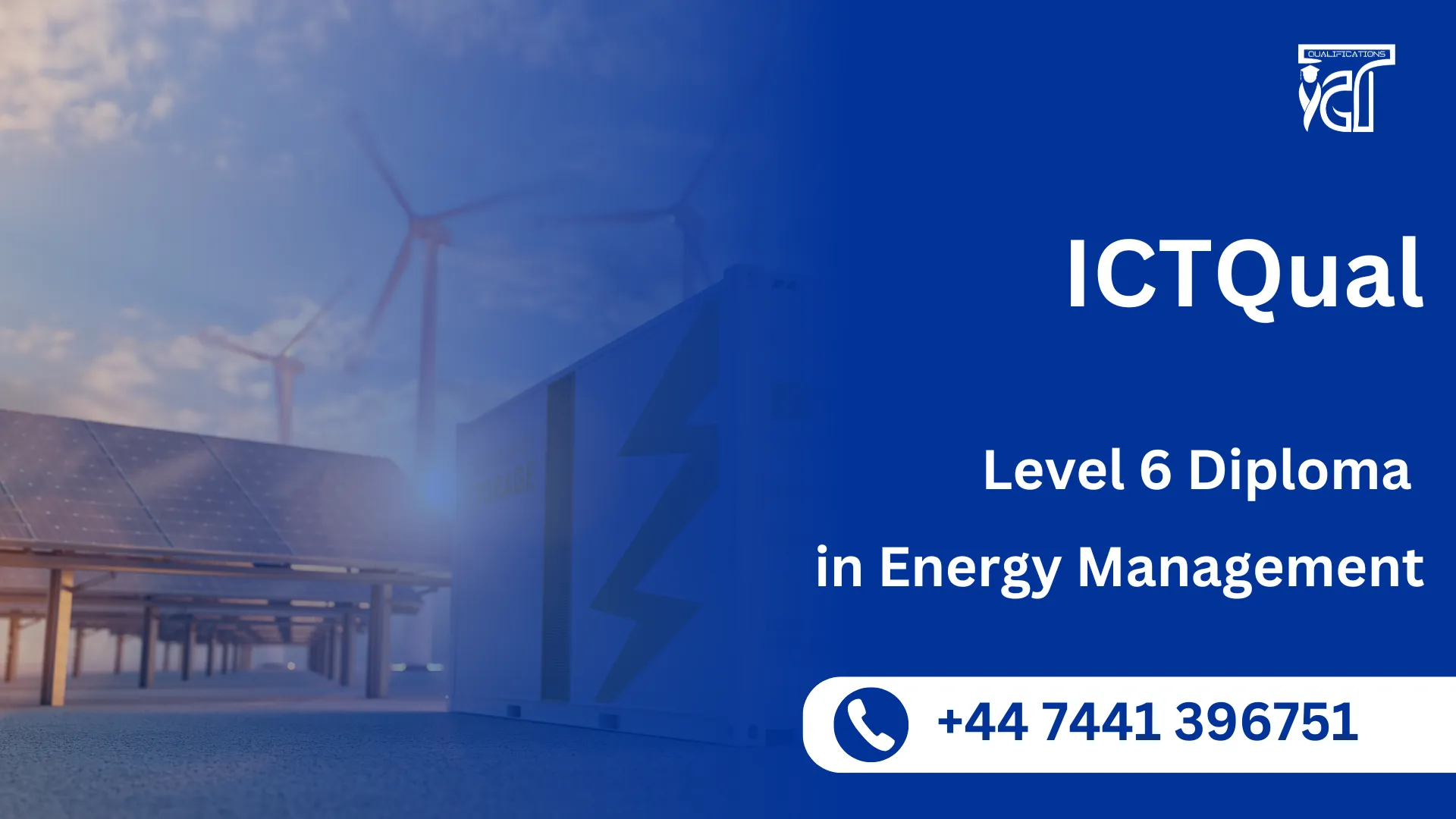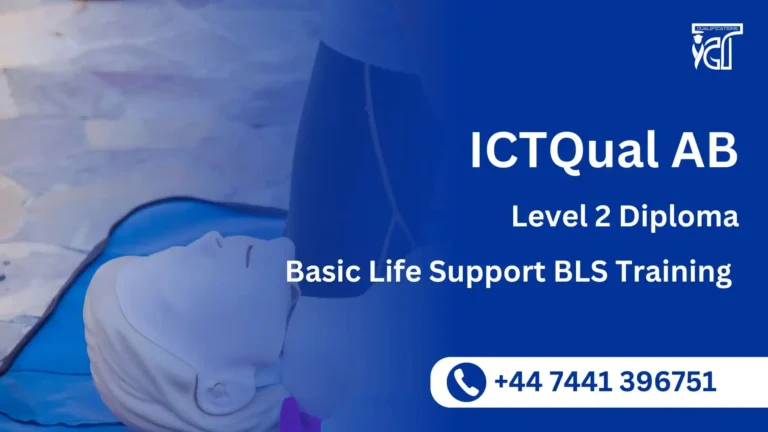The ICTQual Level 6 Diploma in Energy Management is an advanced qualification designed for individuals who want to enhance their expertise in managing energy resources efficiently and sustainably. As the world transitions to renewable energy sources and seeks to reduce its carbon footprint, the role of energy managers has become increasingly important. This course equips professionals with the knowledge and skills to optimize energy consumption, implement energy-saving strategies, and comply with international energy standards.
The ICTQual Level 6 Diploma is Ofqual regulated, ensuring that it meets high academic and industry standards. The course is globally recognized, providing opportunities to pursue a successful career in energy management and sustainability. This qualification is ideal for individuals looking to work in energy management roles or progress their career in this rapidly growing sector.
The ICTQual Level 6 Diploma in Energy Management is designed for individuals with existing experience in energy management, sustainability, or a related field. The qualification focuses on advanced concepts of energy efficiency, sustainability practices, and the application of energy management systems (EnMS). The course provides a comprehensive understanding of energy policy, legislation, and best practices in energy management, enabling students to manage energy usage in both industrial and commercial environments effectively.
The ICTQual Level 6 Diploma in Energy Management is a comprehensive and industry-recognized qualification that provides professionals with the knowledge and skills necessary to manage energy resources efficiently and sustainably. Whether you are looking to advance in your current career, transition into energy management, or lead sustainability efforts within your organization, this diploma offers a pathway to achieving your goals.
By completing this course, you will be well-equipped to manage energy consumption, contribute to sustainability initiatives, and help organizations achieve their energy efficiency targets. With its Ofqual-regulated status and global recognition, the ICTQual Level 6 Diploma in Energy Management opens the door to a wide range of exciting career opportunities in the growing field of energy management.
Enroll today and take the first step towards a sustainable and energy-efficient future!
ICTQual Level 6 Diploma in Energy Management
This qualification, the ICTQual Level 6 Diploma in Energy Management, consists of 8 mandatory units:
| Sr# | Unit Title |
|---|---|
| 1 | Introduction to energy management |
| 2 | Technical and Operational |
| 3 | Behavioural Change and Motivation |
| 4 | Waste Management |
| 5 | Procurement |
| 6 | Energy Assessments, Measurements and Verification |
| 7 | Regulatory & Legal Compliance and Carbon Management |
| 8 | Strategy/Plan in energy management |
GLH (Guided Learning Hours) and TQT (Total Qualification Time) are terms commonly used in vocational qualifications to help define the amount of time a learner is expected to spend on their studies.
1. GLH (Guided Learning Hours)
GLH refers to the number of hours a learner spends being directly taught, supervised, or supported during their course. This includes the time spent in activities such as:
- Classroom instruction
- Practical workshops
- One-on-one tutoring or mentoring sessions
- Online learning sessions with tutor support
In other words, GLH represents the time that learners are actively engaged with their instructors or learning activities.
2. TQT (Total Qualification Time)
TQT represents the total amount of time a learner is expected to invest in completing a qualification, including:
- GLH (Guided Learning Hours): Time spent on direct learning, as explained above.
- Self-Directed Learning: This includes time spent on independent study, research, assignment completion, preparation for exams, and any other work the learner does outside of direct teaching hours.
TQT is a broader measure that includes all the time required to achieve the qualification. It helps learners and employers understand the overall commitment required for the qualification.
Key Differences Between GLH and TQT:
- GLH focuses on direct learning with guidance or supervision.
- TQT includes GLH as well as independent study time and other learning-related activities.
Example:
If a qualification has a TQT of 600 hours and a GLH of 250 hours, it means the learner should spend 250 hours in direct learning (classroom, online, or tutor-led sessions) and 350 hours on independent study or research.
Here are the learning outcomes for each study unit:
Introduction to Energy Management:
- Understand the fundamental concepts and principles of energy management.
- Identify the significance of energy conservation and efficiency in various industries and sectors.
- Learn about different types of energy sources and their environmental impacts.
- Recognize the role of energy management in achieving sustainability goals within organizations.
Technical and Operational:
- Gain knowledge of energy systems, equipment, and technologies used in industry.
- Learn how to optimize energy performance through technical upgrades and operational improvements.
- Understand energy consumption patterns and identify opportunities for efficiency enhancements.
- Develop skills in implementing energy-saving measures and monitoring energy usage.
Behavioural Change and Motivation:
- Understand the psychological factors influencing energy consumption behaviors.
- Learn strategies for promoting energy-saving behaviors and motivating stakeholders.
- Explore techniques for fostering a culture of energy efficiency within organizations.
- Develop communication and engagement skills to encourage participation in energy conservation initiatives.
Waste Management:
- Learn about waste generation, handling, and disposal practices.
- Understand the environmental and economic impacts of waste production.
- Explore methods for reducing waste generation and improving waste management processes.
- Develop strategies for implementing waste reduction and recycling programs.
Procurement:
- Understand the role of procurement in energy management and sustainability.
- Learn about sustainable procurement practices and criteria for selecting energy-efficient products and services.
- Explore strategies for incorporating energy considerations into procurement decisions.
- Develop skills in evaluating suppliers and negotiating contracts to optimize energy performance.
Energy Assessments, Measurements, and Verification:
- Acquire proficiency in conducting energy audits and assessments to identify energy-saving opportunities.
- Learn methods for accurate measurement and verification of energy performance improvements.
- Understand the importance of data analysis and interpretation in evaluating energy usage.
- Develop skills in compiling energy reports and verifying energy-saving claims.
Regulatory & Legal Compliance and Carbon Management:
- Understand the regulatory framework governing energy management and environmental compliance.
- Learn about carbon management strategies and emissions reduction techniques.
- Gain knowledge of relevant environmental laws, regulations, and reporting requirements.
- Develop strategies for ensuring compliance with energy and carbon regulations.
Strategy/Plan in Energy Management:
- Develop comprehensive energy management strategies and plans tailored to organizational needs and objectives.
- Learn how to set achievable goals and targets for energy efficiency and sustainability.
- Understand the importance of stakeholder engagement and collaboration in energy management planning.
- Develop skills in resource allocation, budgeting, and project management for energy initiatives.
Benefits of the ICTQual Level 6 Diploma in Energy Management
The ICTQual Level 6 Diploma in Energy Management offers a wide range of benefits for individuals seeking to enhance their expertise in the field of energy management. Here are the key advantages of pursuing this course:
1. Ofqual-Regulated Qualification
The ICTQual Level 6 Diploma is Ofqual-regulated, ensuring that it meets the highest academic and professional standards. This regulation guarantees that the course is recognized by employers, educational institutions, and industry bodies globally, enhancing its credibility and value.
2. Global Recognition
As a globally recognized qualification, the ICTQual Level 6 Diploma in Energy Management is accepted and respected in energy sectors worldwide. Whether you’re looking to work internationally or within your own country, this qualification opens doors to global career opportunities.
3. In-Depth Knowledge of Energy Management
This diploma provides comprehensive knowledge of energy management systems, sustainability practices, and renewable energy solutions. By covering both technical and strategic aspects of energy management, you will be equipped to lead energy efficiency projects and initiatives in any organization.
4. Practical, Real-World Application
The course includes practical assignments and case studies that enable learners to apply their knowledge directly to real-world energy management scenarios. This hands-on experience ensures that you develop the skills required to tackle the energy challenges faced by organizations today.
5. Career Advancement Opportunities
With the increasing focus on sustainability and energy efficiency across industries, the demand for qualified energy managers is rising. Completing this diploma positions you for career advancement in a variety of roles such as Energy Manager, Sustainability Consultant, Energy Auditor, and Environmental Manager.
6. Expertise in Energy Auditing and Policy Implementation
This course covers energy auditing techniques, helping you assess energy consumption and identify potential savings. Additionally, it provides expertise in implementing energy policies and strategies that comply with regulations, reducing operational costs and environmental impacts.
7. Sustainability and Environmental Impact Focus
The course emphasizes sustainable energy management practices, including the use of renewable energy sources and energy conservation techniques. By completing the diploma, you will contribute to reducing an organization’s carbon footprint and supporting global sustainability goals.
8. Cost Savings for Organizations
With the knowledge gained from this course, you can assist organizations in reducing energy consumption, cutting costs, and improving operational efficiency. As businesses seek ways to minimize their energy expenditure, qualified energy managers are essential to identifying and implementing energy-saving solutions.
9. Financial Benefits and Cost-Benefit Analysis Skills
The course includes modules on financial planning for energy projects, teaching you how to conduct cost-benefit analyses and manage budgets effectively. This enables you to ensure that energy-saving projects are financially viable and deliver a positive return on investment.
10. Comprehensive Coverage of Legislation and Standards
The diploma provides an in-depth understanding of national and international energy policies, laws, and standards. This ensures that you can navigate complex legal frameworks, ensuring compliance with regulations and contributing to safer, more efficient energy practices.
11. Improved Industry Credibility
Completing the ICTQual Level 6 Diploma helps establish you as a skilled professional in the energy management field. Your expertise and knowledge will be recognized by employers, stakeholders, and clients, enhancing your professional reputation and increasing your employability.
12. Foundation for Further Study
If you’re interested in continuing your education, the ICTQual Level 6 Diploma serves as a strong foundation for pursuing higher qualifications in energy management, sustainability, or environmental science. It also provides a pathway to gaining certifications from industry-leading organizations like ISO 50001 or NEBOSH.
13. Networking Opportunities
As you study for the diploma, you’ll have opportunities to connect with industry professionals, potential employers, and fellow learners. Networking within the energy management sector can provide you with valuable insights, career opportunities, and collaborative partnerships in your professional journey.
14. Enhances Organizational Sustainability Efforts
Organizations increasingly value professionals who can help them reduce energy consumption and achieve sustainability targets. By earning the ICTQual Level 6 Diploma, you’ll play a key role in helping organizations meet their environmental and energy efficiency goals, contributing to corporate social responsibility (CSR) initiatives.
15. Flexibility for Working Professionals
The ICTQual Level 6 Diploma in Energy Management is designed to be flexible, making it suitable for working professionals. The course is generally offered through a combination of online learning and practical assessments, allowing learners to balance their study with work commitments.
Best Fit for the ICTQual Level 6 Diploma in Energy Management
The ICTQual Level 6 Diploma in Energy Management is ideal for professionals who are either already working in or looking to enter the energy management, sustainability, or environmental sectors. This qualification is designed for individuals who want to enhance their expertise in managing energy use, implementing sustainable practices, and contributing to reducing environmental impact in various industries. Below is a breakdown of the best-fit candidates for this course:
1. Energy Managers and Energy Consultants
If you are already working as an Energy Manager or Energy Consultant and want to formalize your skills or expand your knowledge of energy management systems (EnMS), this course is perfect for you. The ICTQual Level 6 Diploma will help you refine your expertise, allowing you to take on higher responsibilities, lead more complex energy-saving initiatives, and provide strategic solutions to organizations aiming to reduce their energy consumption and carbon footprint.
2. Sustainability and Environmental Professionals
Professionals working in sustainability and environmental roles, such as Sustainability Consultants, Environmental Managers, or Green Building Professionals, will find this course a valuable addition to their skill set. The qualification provides a deeper understanding of energy management systems and renewable energy practices, enabling you to broaden your role in guiding organizations toward more sustainable and energy-efficient practices.
3. Facilities Managers
If you are responsible for overseeing the operational management of facilities, such as Facilities Managers, you will benefit from learning advanced energy management techniques. This course will enable you to make your facilities more energy-efficient, reduce operational costs, and ensure compliance with energy regulations. It’s especially beneficial for those working in large commercial, industrial, or government buildings.
4. Engineers in Energy-Related Fields
Engineers with a background in energy, mechanical, electrical, or civil engineering will find the ICTQual Level 6 Diploma ideal for transitioning into more focused roles in energy management. The qualification will allow engineers to combine their technical knowledge with the practical skills needed to manage energy resources, implement sustainability practices, and work on energy-saving projects.
5. Project Managers and Leaders
If you are a Project Manager or in a leadership role responsible for managing energy-related projects, this course provides the tools to lead energy-efficient projects, such as energy audits, renewable energy installations, and sustainability programs. The course’s focus on financial planning, cost-benefit analysis, and energy policies will prepare you to manage budgets, assess energy savings, and communicate effectively with stakeholders.
6. Government and Policy Makers
For individuals working in government, public policy, or energy regulation, the ICTQual Level 6 Diploma in Energy Management provides an in-depth understanding of energy policies, legal frameworks, and international energy standards. The knowledge gained can support the development of energy-efficient public policies, sustainability initiatives, and legislative frameworks that align with global climate and energy goals.
7. Entrepreneurs and Business Owners in Energy Sector
Business owners or entrepreneurs involved in the energy sector, especially those focusing on energy-efficient technologies or renewable energy solutions, will benefit from this qualification. It will help you expand your business strategies, improve energy efficiency within your own operations, and give you the credentials to attract clients in need of professional energy management services.
8. Individuals Seeking Career Change into Energy Management
If you are looking to transition into a career in energy management and sustainability, the ICTQual Level 6 Diploma is a great way to gain the essential knowledge and skills required to succeed in the energy industry. Whether you’re from a business, engineering, or environmental background, this course provides a solid foundation for entering the rapidly growing field of energy management.
9. Corporate Social Responsibility (CSR) Professionals
If you are responsible for overseeing CSR initiatives in your organization, particularly those related to sustainability and energy efficiency, this course can enhance your understanding of how to manage energy consumption, reduce environmental impact, and achieve sustainability goals. This will improve the overall reputation of your company while aligning with green policies and global sustainability targets.
10. Graduates and Individuals Interested in the Growing Energy Sector
For fresh graduates or individuals looking to specialize in the expanding field of energy management, this course offers an excellent entry point. It provides essential knowledge of energy efficiency technologies, energy auditing, and sustainable energy practices, making it ideal for those aiming to work in green energy sectors or consultancy roles.
Entry Requirements
Register Now
Qualification Process
Qualification Process for the ICTQual Level 6 Diploma in Energy Management
- Self-Assessment:
Begin by evaluating your eligibility to ensure you meet the qualification requirements, including work experience, knowledge, and language proficiency. - Registration:
Complete your registration by submitting the required documents, including a scanned copy of a valid ID, and paying the registration fee. - Induction:
An assessor will conduct an induction to confirm your eligibility for the course and explain the evidence requirements. If you do not meet the criteria, your registration will be canceled, and the fee will be refunded. - Assignmnets & Evidence Submission:
Provide all assignmnets and the necessary evidence based on the assessment criteria outlined in the course. If you are unsure of the required evidence, consult with the assessor for guidance on the type and nature of evidence needed. - Feedback and Revision:
The assessor will review your submitted evidence and provide feedback. Evidence that meets the criteria will be marked as “Criteria Met,” while any gaps will be identified. You will be asked to revise and resubmit if needed. - Competence Evidence:
Submit final evidence demonstrating that all learning outcomes have been met. This evidence will be marked as “Criteria Met” by the assessor once it is satisfactory. - Internal Quality Assurance (IQA):
The Internal Quality Assurance Verifier (IQA) will review your evidence to ensure consistency, quality, and compliance with standards. - External Verification:
The IQA will submit your portfolio to ICTQUAL AB External Quality Assurance Verifiers (EQA) for final confirmation. The EQA may contact you directly to verify the authenticity of your evidence. - Certification:
Upon successful completion of all checks, ICTQUAL AB will issue your official certificate, confirming that you have attained the ICTQual Level 6 Diploma in Energy Management.







